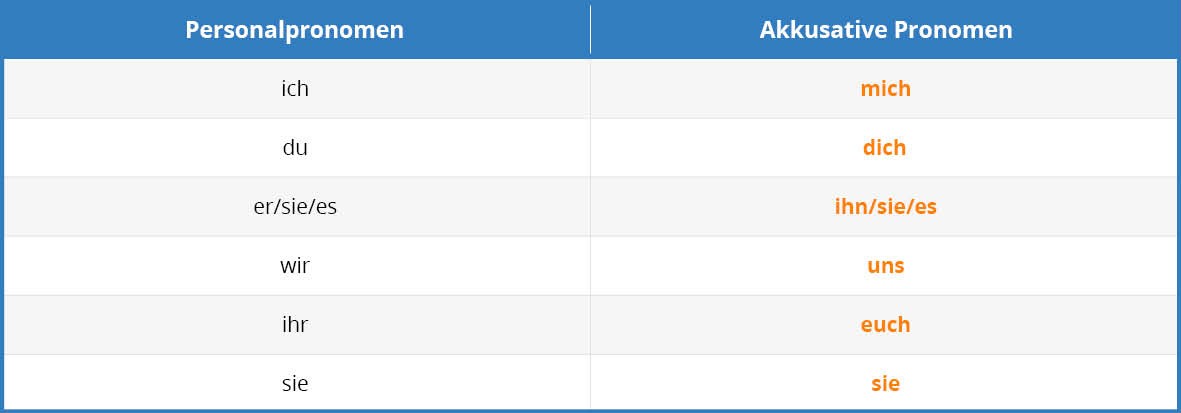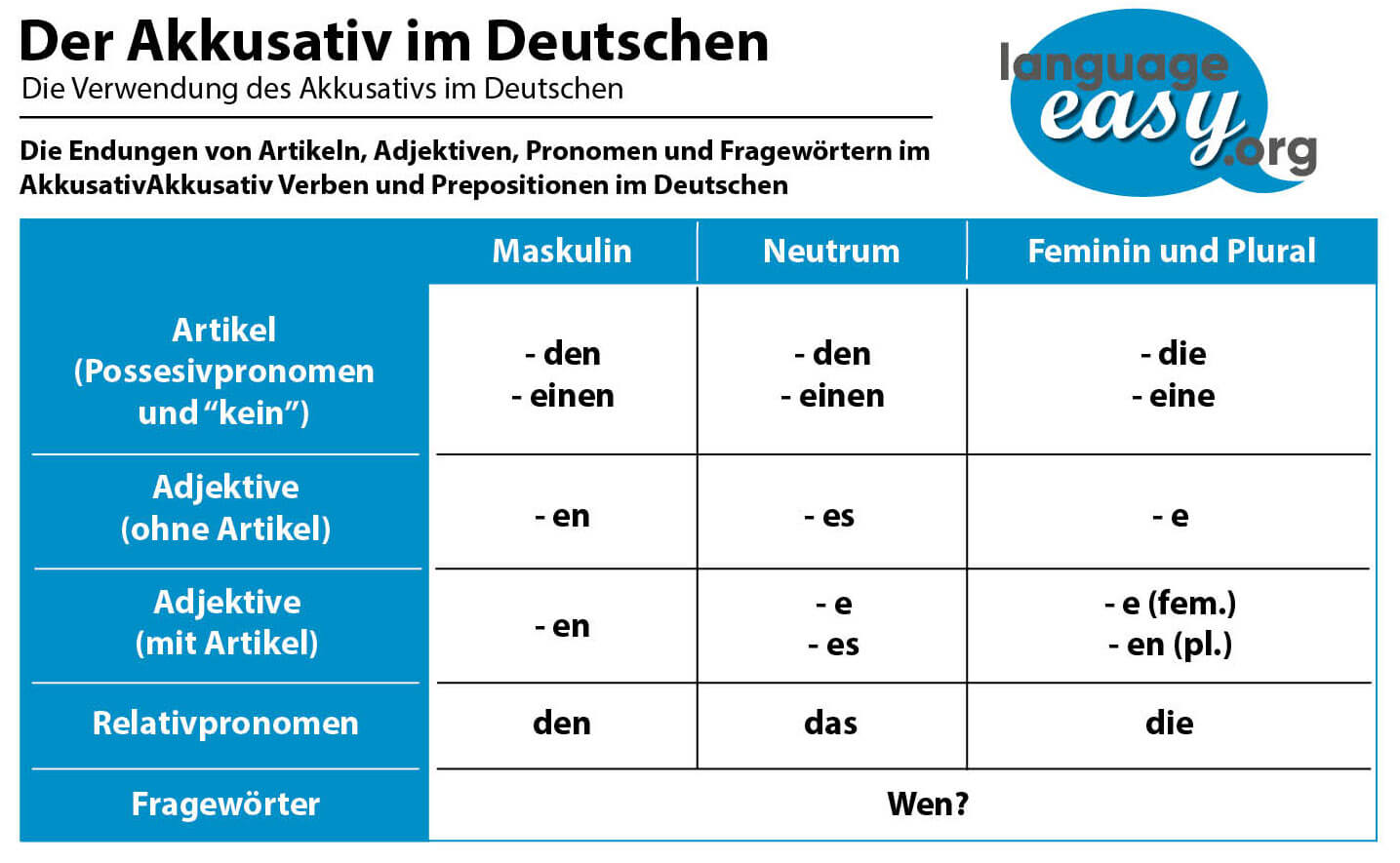German Accusative
Der Akkusativ im Deutschen – Erklärungen und Beispiele
German Accusative – Summary
Zusammenfassung
A noun is in the fourth grammatical case, the accusative, when it is a direct complement (object) to the predicate and when you determine it by asking “Wen oder was?”. Depending on the gender, you use the definite article “den, die, das” for the accusative object.
Usually, the nouns in the accusative have the same form as those in nominative, except for masculine nouns.
- “der Hund – den Hund, die Katze – die Katze, das Pferd – das Pferd”
In the plural, the definite article of the accusative object is “die“, and there are no additional endings used.
- “Die Hunde – die Hunde, die Frauen – die Frauen, die Kinder – die Kinder”
In the plural, there should not be any marker on the noun itself, but exceptions are some masculine nouns which have the additional endings “-n” or “-en” in the accusative.
- “Der Hund – den Hunden, der Student – den Studenten”
Welcome to language-easy.org! So, as you have chosen this article, you are presumably ready to enter the depth of German grammar. In the following you will notice, of what essential importance German accusative is.
For sure, many of you get confused with all the articles that exist in German. Especially compared to the English language, there is a huge variety of articles. Of course, you have noticed that they depend on the gender, the number and the case of the noun they are attached to. But, don’t worry. In this article we’d like to try to clarify a little bit why and when you chose a certain grammatical case and the corresponding article.
For now, we will focus on the German accusative case. First of all, we will try to clear up what the German accusative actually is. After that, we will look at its usage and also at the articles that correspond to this grammatical case.
What is the German accusative case?
Was ist der Akkusativ im Deutschen?
First of all, we have to understand what the German accusative case actually is. So, let’s use an example phrase to illustrate the German accusative.
- “Der Junge sieht die Biene.” – The boy sees the bee.
Well, in this example phrase, “die Biene” represents the German accusative case. So, the accusative word in a sentence is the direct object, the person or thing being acted upon. Although the article “die” of “Biene” seems like a normal singular feminine article, it is also the accusative form. Well, in other cases you will see that the article does change from its “normal” form.
Let’s take another example with aa accusative pronoun instead.
- “Der Junge sieht sie.” – The boy sees it (lit. her).
Here, you can see how “die Biene” is replaced by the accusative pronoun “sie”. Actually, these changes are quite familiar to you as the same happens in the English language. Nevertheless, we’d like to show you a list of German accusative pronouns in the following.
German Accusative and Personal Pronouns

So, we will come to the next part of this article and talk about the usage of German accusative in the following.
The Usage of German Accusative
Die Verwendung des Akkusativs im Deutschen
Of course, we will have to explain when to use the accusative case. Well, for German speakers it is quite easy. Maybe, you have heard, that Germans simply ask the question “Wen order was?” and the answer shows them, what the accusative word in the sentence is. Unfortunately, this kind of determining the German accusative case in a sentence does not make any sense to non-German-speakers. But, don’t worry, there are basically three other ways to determine whether the German accusative is needed or not.
- First, you have to use the German accusative case after certain verbs. Well, you simply have to learn those verbs by using verb lists or other methods.
- Second, there are prepositions that imply the German accusative after them. Exactly, you also have no other chance to master them than studying hard.
- Last but not least, we use the German accusative as the direct object in sentences with more than one object.
The Declension of German Nouns in Accusative
So, as a last point about the German accusative, we should talk about the declension of nouns in the accusative. Well, as I have already mentioned, the declension, and so the article of the noun, is influenced by gender, number and case. Exactly, we are talking about masculine, feminine and neuter, plural and singular, and, of course, everything in the accusative case.
In the following table we’d like to show you the declension of German accusative nouns with definite and indefinite articles.

Well, we have come to the end of this article about German accusative. Hopefully, you have achieved the information you were looking for. Furthermore, we hope that we could clear up the basic principles of this German case, its definition and its correct usage. Please, keep in mind that German can only be mastered if you put a lot of effort into it – so keep on studying, studying and studying. And now, auf Wiedersehen!
Exercises
Übungen
Finally, we have reached the last part of this article where you can prove the German skills you have just learned. In the following you will see some phrases you should complete with the correct terms. Once you have filled all the gaps, just click on the “correct” button and you can see your errors and the correct results. Good luck and… auf Wiedersehen!



